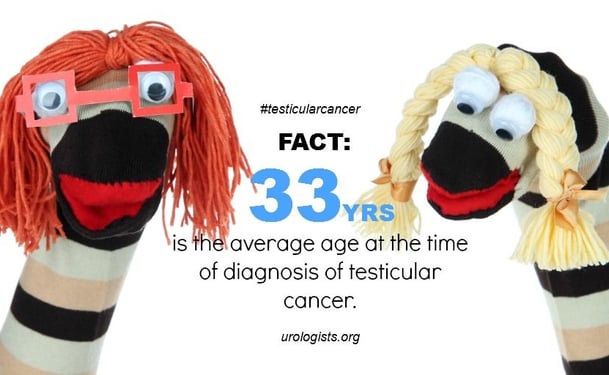Testicular cancer is the bad news. The good news is that it is treatable and highly curable, especially when caught early enough. Despite advancing science, testicular cancer does still lead to the deaths of around 10% of men who are diagnosed each year. Just like any cancer, testicular cancer can recur.
- FACT: Although testicular cancer usually strikes men between the ages of 15 and 40 years old, it can occur at any age.
- FACT: 90% of men are cured.
Testicular Cancer Myths and Facts
There are some myths surrounding testicular cancer, such as "it only occurs in older, white males", however, that is not completely true.
- FACT: Testicular cancer typically is found in men in the prime of their lives, before middle age or advancing years although it has also shown up in male infants and elderly men as well. While this form of cancer does tend to show up much more frequently in men of Caucasian descent, men of African or Asian descent are still at risk.
Another myth is that sexual behavior can lead to testicular cancer.
- FACT: Doctors say there is no concrete evidence to back this idea up. There are risk factors, however, sexual behavior is not one of them.
Human immunodeficiency virus (HIV) may present a slightly higher risk for developing testicular cancer, but it is a very small "slightly higher" risk.
Risk Factors for Testicular Cancer
- An undescended testicle – Known medically as "Cryptorchidism", an undescended testicle is a main risk factor for developing testicular cancer. This occurs in utero, when a mal baby's testicle doesn't properly descend into the scrotum during fetal development. Abnormalities in the penis, kidneys or testicles may also lead to an increased risk.
- A family history, or any history – If a male relative in close relation to you (such as a father, or brother) has been diagnosed with testicular cancer, you're at risk too. If you've had testicular cancer in one testicle already, you have a much higher chance of seeing it show up in your other testicle as well.
- Health conditions – Having a hernia or mumps (from the virus that leads to a severe swelling of glands) can increase the chance that you'll develop testicular cancer. Repeated trauma to the scrotum area may also be a factor.
Testicular Cancer Symptoms
Some people who are ultimately diagnosed with testicular cancer have no idea there is a problem.
- FACT: Testicular cancer can strike without symptoms.
This is why it's important to have regular checkups with your doctor and to specifically have your scrotum looked at. Symptoms that warrant a closer look are:
- Any swelling, fluids or a sensation of 'heaviness' in your scrotum at all
- Pain, aching or discomfort in the scrotum area, the general groin area or the lower abdomen
- Changes in your sex drive
- Tenderness or changes in male breast tissue
When to see your doctor
It's important that you are familiar with the geography of your body so that you will know when something is abnormal. As part of your regular medical routine, you should ask your doctor to check you for any suspicious lumps that might need closer examination.
- FACT: You are more likely to detect testicular cancer than your doctor.
Most cases of testicular cancer are found by men themselves or their partners. You can perform a self-examination as well – and you should, once a month. Gently hold the scrotum in palm of your hand and manipulate the area to feel for any hardening or lumps. Do one testicle and then the other.
If you feel something abnormal or if you have pain or notice any swelling in the area, make an appointment to have it checked out by your doctor. Although testicular cancer has a very high cure rate, men die from it every year. Statistically, about 30% of testicular cancer cases lead to the cancer spreading in other areas, which makes it of the utmost importance to catch a problem as early as possible.
Feel something unusual? Find a doctor near you.


